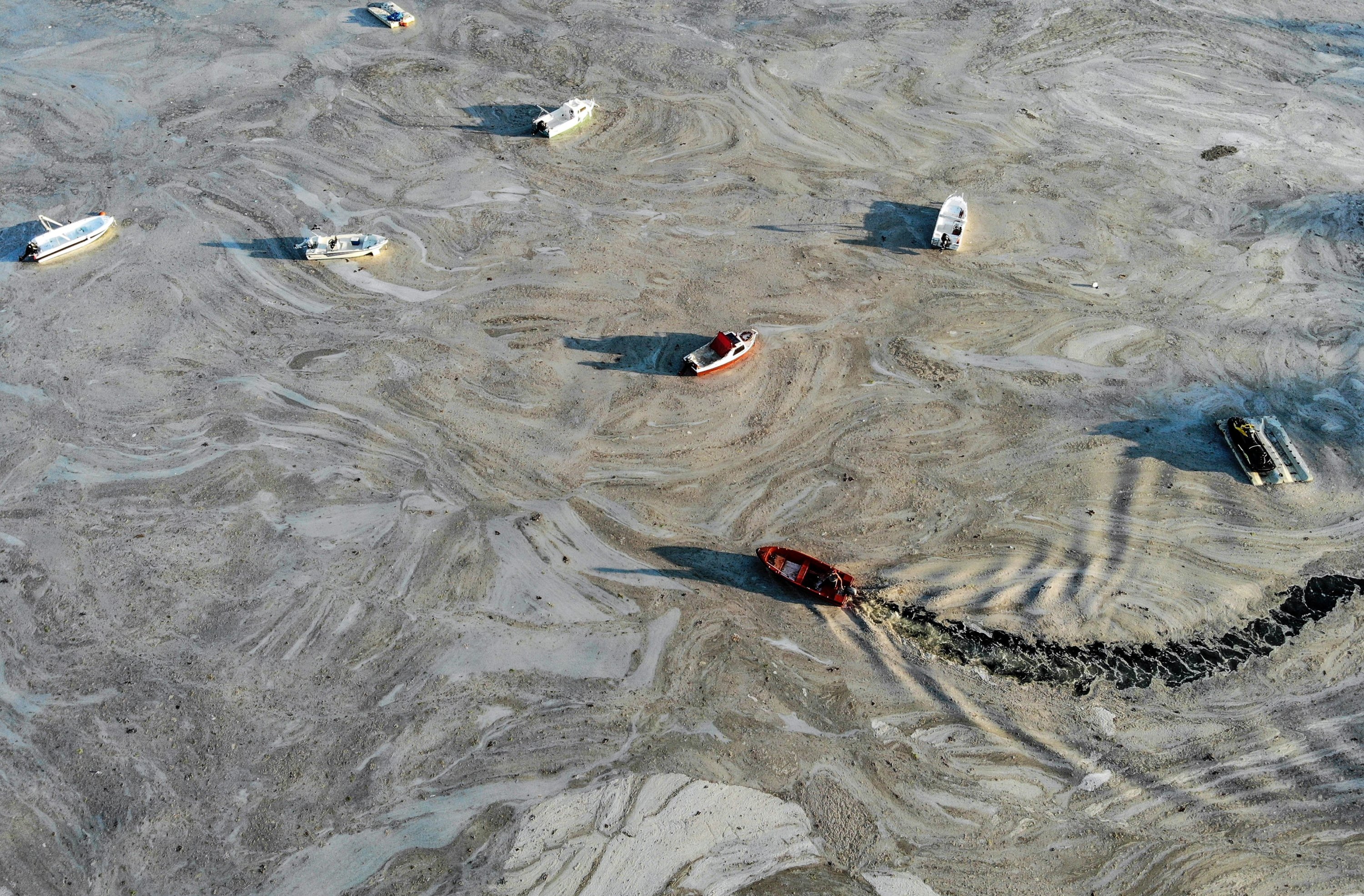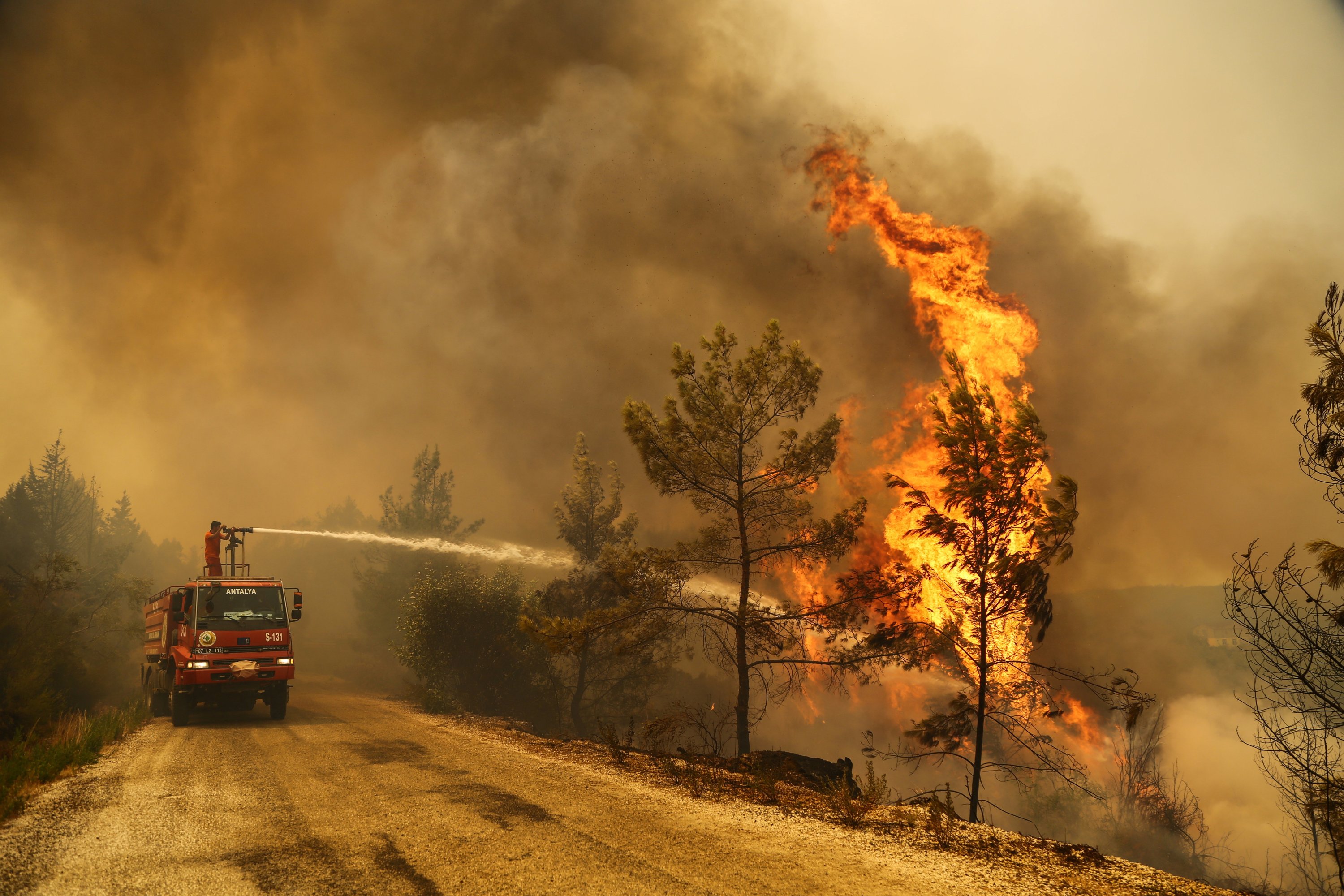© Turkuvaz Haberleşme ve Yayıncılık 2024
"Good riddance" could have been the phrase to see off 2020 after Turkey, like the rest of the world, grappled with the coronavirus outbreak. However, the pandemic lingered in 2021, a year with only more disasters in store for the country courtesy of the climate crisis.
Drought, for instance, made its presence more known across lakes, rivers and dams throughout the year, and it doesn't appear to be going away any time soon as the country readies its plans in case the water shortage worsens. The country’s largest lakes, Van and Tuz, noticeably shrank, while images of boats on parched land made visible by receding waters were a common, tragic sight at dwindling bodies of water across the country. Environmentalists say climate change and aggressive farming methods have fueled the risk of water shortages, which surfaced in late 2020 as official data showed water levels at dams had fallen to record lows due to a lack of rainfall. In a speech in October, President Recep Tayyip Erdoğan painted a gloomy picture based on data that indicated the country’s usable water supplies would keep shrinking. "Turkey is not a water-rich country," he said. "This data shows that our water potential, which we are already not rich in, will fall more in coming years."
The country was on alert after a lengthy winter dry spell prompted concerns of a water shortage, especially for the metropolis of Istanbul. The ensuing rains alleviated concerns, but the risk of future droughts lingers. As a precaution, authorities have readied several action plans, and Erdoğan assured the public in March that plans for water management have been laid out all the way up to 2071.
As the drought took hold, another water-related threat emerged in the Marmara Sea: "sea snot," or marine mucilage. A phenomenon that had manifested itself to a limited extent in the past, sea snot made the headlines early in the summer, weeks after the first layer of the thick substance surfaced on the shores of the Marmara Sea. Within a few weeks, it expanded from Tekirdağ in the northwest to Bursa in the south of the sea. A product of microscopic algae called phytoplankton, which forms the base of marine and freshwater food chains, the mucus-like substance was the result of decades of pollution in the Marmara Sea. What made the situation worse, however, was another culprit: climate change. Mucilage is secreted in response to changes and anomalies in sea conditions, but it requires a stagnant sea and high levels of nitrogen and phosphorus to form. Mucilage, which is part of a natural process under normal conditions, can expand excessively when the weather gets warmer in the spring months in the right temperature and light. However, as in the case of the Marmara Sea, experts say the structure of the sea, heightened pollution and waste and global climate change are the main catalysts behind the extreme mucilage formation. In June, an intense cleaning campaign was launched in cities littoral to the Marmara, and it took a few weeks to completely skim the mucilage from the surface, which was then disposed of on land. The mucilage threat, however, ensued at the bottom of the sea longer, choking marine life.

In the north, the Black Sea region was gripped with floods in the summer. The first major floods hit Rize, a province accustomed to flooding, in July, killing at least six people. But the worst floods of the year and in the recent history of the region were in an area further west of Rize in August. Kastamonu, Bartın and Sinop were inundated with floodwaters after an unprecedented amount of rain. In Kastamonu’s Bozkurt, where floodwaters destroyed multistory buildings, dozens of people were killed in the span of a few days, and many are still missing. Again, the climate crisis made things worse for a region that already experiences almost year-round rainfall due to its climate. Experts say rising seawater temperatures stemming from global warming are among the causes of the more devastating floods that have become common in the region over the past decade.
Along with floods, the country was forced to battle several forest fires this year and deal with the tragic aftermath. Starting late July and continuing into the second week of August, the wildfires were particularly devastating for Antalya and Muğla, two Mediterranean provinces. Extreme temperatures in the two cities with warm climates and strong winds fanned the flames that devastated villages and killed eight people.

In November, climate change reared its head again, this time in the form of storms. In one of the deadliest storms to hit Istanbul and other cities in the west in recent memory, six people lost their lives when unprecedented strong winds knocked down walls, tore off roofs and wreaked havoc in the Marmara region.
It was not all hopeless for Turkey when it comes to the fight against climate change. Years after becoming a party to the Paris climate deal, in 2021 Turkey finally officially ratified the pact after alterations were made to the conditions that Ankara said unjustly put a financial burden on the country by classifying it as a developed country, meaning it doesn't require additional funds to finance efforts to counter climate change.
Turkey also signed a memorandum of understanding with international institutions for loans worth more than $3.1 billion (TL 39.4 billion) to help it meet clean energy goals set out in the Paris Agreement, authorities announced in October.
The Zero Waste Project, championed by first lady Emine Erdoğan, also gained traction in 2021. The recycling program, which aims to curb pollution and the impact of the climate crisis, recycled 24.2 million tons of paper, plastic, glass and organic waste between 2017 and 2021. The project aims to push Turkey’s recycling rate to 35% by 2023 while creating employment for some 100,000 people in the recycling industry. It found huge interest both in the public and private sectors. The government has provided training for 12.5 million people on zero waste practices so far while some 100,000 public institutions, as well as some municipalities, have switched to zero waste policies – from reducing waste to properly sorting it at its source to be properly recycled.
